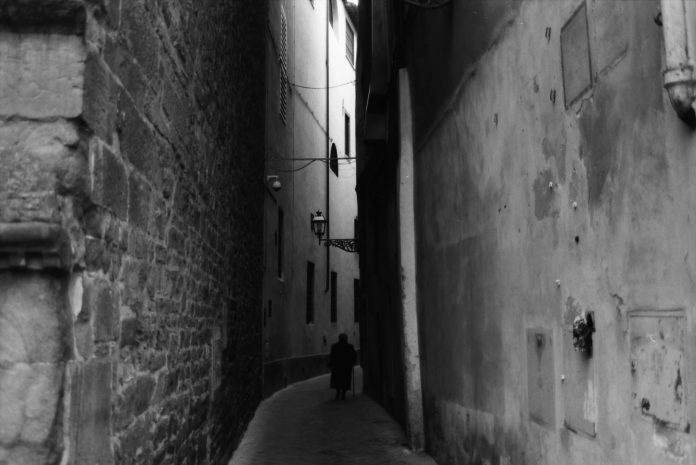“Here is really shitty,” she said.
It was an appraisal of frankness I wouldn’t have expected given her appearance—older than my parents’ generation, possibly much older, with an accent hailing from somewhere far away—maybe one of those hidden countries, the kind we forget to remember. She seemed rich with unseen culture. I wondered what worlds she once daily knew, perhaps in Belarus, Moldova, the Baltics. We were heading up Third Avenue, approaching Pike Street. The view was an echo of New York City before the ’90s cleanup—life in profusion, reduced to scraps and oozing with color and death.
“Sometimes,” I replied. You know me; I can’t agree with such a statement outright.
“Ha!”
I like it out here. I met her halfway, saying, “Sometimes it’s good, sometimes it’s bad.”
She chuckled. Our comments sounded ridiculous looking around, surrounded as we were by sharp and putrid angles lurking in the shadows. But I think she caught the reason for my drift; I have to be out here, and I need my soul to survive. Bemoaning the state of things never helps. I said, “I have to look for the bright side, you know?”
She nodded wearily: “Yeah, it’s true.”
“It’s how we stay sane.”
“They’re mostly harmless. These people.”
“They’re mostly harmless.”
“In my opinion,” she added. “They deserve better.”
“They deserve better. I agree.”
“It’s just shitty. Amazon, what they have done. They say they give 500 million dollars, but where is it? I don’t see it. I think it’s corruption. In my opinion.”
“I think so too! They’ve made life hard for everybody!”
“I was going to make a donation. But I decided not to.”
“That’s good.”
“There is so much corruption going on right now, this country.”
“It’s terrible!”
She shook her head. “I think this country is corruption.”
“I think so too!”
Her accent told of places and times where such thoughts were not allowed. Her sharing this was special. A gesture. Her next line, a farewell, was a wink:
“I love this country!”
“Ha! I love this country!”
It was both a world-weary joke and a genuine expression, all at once. We do love this country. We who know of inhumanities abroad have the perspective to realize what freedom exists here. I thought of a young African immigrant who recently exclaimed to me, “Are you kidding me? This place is great! Here you can be who you want, how you want! Do you know how good you have it?”
Then I thought of Churchill’s famous quip, and its reminder toward frame of reference: “Democracy’s the worst form of government. Except for all the other ones!”
Yes, there are things intolerable in this place. But here we don’t have to express such by fearfully repeating, “I love this country.” She could say that to me not in self-preservation, but for a companionable chuckle. We ended on a note of humor, not dejection. Laughter keeps us closer to the light, gets us through life’s journey intact. You have to laugh.
I watched her walk across the street, through the lingering mass on the corner– through, around, and completely unafraid.
Nathan Vass is an artist, filmmaker, photographer, and author by day, and a Metro bus driver by night, where his community-building work has been showcased on TED, NPR, The Seattle Times, KING 5 and landed him a spot on Seattle Magazine’s 2018 list of the 35 Most Influential People in Seattle. He has shown in over forty photography shows is also the director of nine films, six of which have shown at festivals, and one of which premiered at Henry Art Gallery. His book, The Lines That Make Us, is a Seattle bestseller and 2019 WA State Book Awards finalist.



